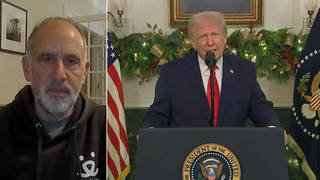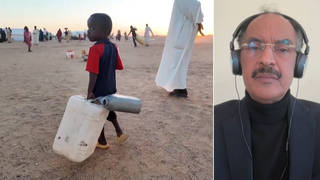
Among the consequences of Israel’s war on Gaza is the destruction of the local economy. Even before the latest Israeli assault, daily life and commerce in Gaza were crumbling as a result of a 15-year siege on the territory enforced by Israel and Egypt. Meanwhile, Israel is withholding millions in taxes collected on behalf of Palestinians, leaving the Palestinian Authority unable to distribute wages to many public sector employees, while more than 150,000 Palestinian workers from the West Bank are now unable to work inside Israel due to new restrictions imposed after October 7. We go to Ramallah to speak with economist Raja Khalidi, director general of the Palestine Economic Policy Research Institute. Khalidi says Israel is using a range of tools in its “economic warfare” against Palestinians, and warns, “We are on the precipice of a warlike situation in the West Bank.”
Transcript
AMY GOODMAN: This is Democracy Now!, democracynow.org, The War and Peace Report. I’m Amy Goodman.
Israel’s assault on Gaza has exacted a devastating toll, with over 25,000 people killed, 63,000 wounded, 1.7 million, at least, displaced. And among the consequences of the offensive is the decimation of Gaza’s economy. Even before the latest Israeli assault on Gaza began over three months ago, Gaza’s economy was already crumbling, the result of a 15-year-long siege on the territory enforced by Israel and Egypt. Now with vast swaths of Gaza destroyed by the Israeli military and severe restrictions on humanitarian aid coming in, more than half a million people are facing catastrophic hunger. That’s according to the United Nations.
Meanwhile, Israel is withholding millions in taxes collected on behalf of Palestinians earmarked for Gaza. On Sunday, Israel approved a plan to send those tax revenues it’s frozen since November to Norway to be held in escrow, instead of the Palestinian Authority. While the PA was ousted from Gaza in 2007, many of its public sector workers kept their jobs and continue to be paid with transferred tax revenues that are being held by Israel, further exacerbating the crisis in Gaza.
For more, we’re joined by Raja Khalidi. He’s the director general of the Palestine Economic Policy Research Institute, joining us from Ramallah in the occupied West Bank.
Raja, thanks so much for being with us. If you can start off by talking about whose money is this? And talk about the amount that’s supposed to go to Gaza and to the West Bank, and how Israel has control over it. Why do they have control over it?
RAJA KHALIDI: Thanks a lot, Amy, and for this chance to talk with you.
Before plunging into the dirty details of the economics of this war, I just want to just say a word of tribute to the journalists, like Akram, so many of them who have been reporting, who have been shocking us every day. And what is more shocking — and we’re talking about millions of us watching, listening around the world, here and the rest of Palestine. What is most shocking is that they’re able to still do their job so well and so professionally. So, I mean, we’ll come back to Gaza, but, really, you know, you don’t need an economist to tell you to what’s happened to the economy of Gaza. We just heard a lot. It tells so much of a story.
The entanglement of Palestinian Authority’s public finances with Israel goes back to Oslo. Funnily enough, it’s come back home to Oslo, in the sense that this was all part of an arrangement made for a five-year period whereby Israel was allowed, because of — de facto, when Oslo agreements were signed, to control the collection of Palestinian external trade taxes at its borders, because it, of course, controls all the Palestinian trade, both that trade that comes from the Israeli economy, as well as from around the world. So, that set up a mechanism called the clearance mechanism, whereby all of the recorded imports, through Israel or from Israel to the PA, are calculated and handed over on a monthly basis to the Palestinian Authority. Now, this was a suitable arrangement in the interim period that was supposed to end in 2000, but then it was perpetuated because nothing else took its place since then, but gradually interpreted unilaterally by Israel in its own — according to its own financial security and political interests.
So, from early on, this mechanism became one of the weapons, if you wish, of economic warfare, and pacification or warfare, so carrot or stick, that Israel has used in its relationship with the Palestinian economy, with Palestine, with the Palestinian people. Now, that has entailed, over the years, especially in the last five or six years, unilateral deductions that Israel makes. So, it makes deductions for electricity consumption that it claims has not been paid, for water, sewage, etc., treatment, and for other, medical referrals to Israeli hospitals, and then — which is something the PA came to accept, because it had no fiscal leverage against Israel. And then, in the last five years, Israel, of course, has been deducting sums equivalent to what the PA pays to the prisoners’ and martyrs’ families — again, at loud protest by the PA, but with little effect. This is an issue that the, you know, Norwegians, the AHLC, the IMF have been seized with for years, but nobody has done anything about. So, you know, this most recent unilateral decision by an extremist settler government to deduct what they claim is the equivalent of what the PA continues to pay salaries to its former, I mean, employees, but who are now actually not mainly working in the West Bank [inaudible], you know, is something that — what can we expect the PA to do? I mean, it tried to reject it out of principle, but, on the other hand, it’s collapsing. Its fiscal situation is near disastrous.
So, exactly what this entails, this escrow account, I mean, if it means that the PA can say, “Well, at least Israel is not holding the money that it illegally deducted, and we reject totally its deduction, hence we’ll take the rest,” OK, that’s going to allow it to stumble through the next couple months perhaps, make some new, you know, refinancing — debt refinancing deals, etc., with the banking system, and eventually hope that when things calm down, Smotrich will allow the Norwegians to release the funds, which, again, is perhaps somewhat fantastical. Perhaps it’s better to say it’s better to have the Norwegians holding it than — but that’s it. I mean, it doesn’t really change the equation, except that it deblocks a certain amount of Palestinian trade revenue. On the other hand, we’ve got to realize that this trade revenue is directly linked to the level of economic activity, and the level of economic activity in the West Bank has collapsed — I mean, not as much, of course, as Gaza, which is now a — is a non-economy, in fact. But in the West Bank it’s been more about the return of workers from Israel and what they are no longer spending in the local economy for four months, the cutoff of clearance revenues. But most importantly is the general reduction in economic activity means that we’re importing less. So, if we’re importing less, there’s less revenue. So, the average monthly revenue is going down regardless of Israeli deductions.
AMY GOODMAN: So, talk about the effects on the ground of not having this money. And who exactly in the current government is deciding who gets what? I mean, you talk about Smotrich. There’s Ben-Gvir. Of course, there’s Netanyahu. What’s happening with — what’s happening in the West Bank? What’s happening in Gaza? And where does the U.S. stand on this? And that’s a critical question, because the U.S. actually can exert so much control, given, as one Israeli general said, that almost all of their weapons are from the United States, that they could not move ahead with what they’re doing with Gaza without U.S. support.
RAJA KHALIDI: It’s arguable as to how much control the United States actually has on this government, to begin with. But regardless of that, we know that it doesn’t want — the United States does not want to exercise any serious influence on this file, for example. All it was able to do is to come up with this Norway escrow account deal, which doesn’t really do anything, because it’s not going to be compensated to — it says that money can neither be transferred to the PA nor used as a loan to the PA. Now, maybe it’s going to mean that the PA can borrow — which it should be able to do, because it’s supposedly a government — on, you know, internationally, to fund part of its deficit. But that’s, again, another stopgap measure. So, the PA, there’s very few decision-makers on this in the Palestinian Authority. There’s the president and the prime minister and the minister of finance. And they’re going and coming, I presume, with the different interlocutors, trying to come up with something that keeps the treasury able to pay part of its salaries bill.
The salary bill in the West Bank is about $4 billion a year, which is about 80% of the public budget. So, you know, that has already been cut prior to the war, because of other reasons, because of the deductions that we mentioned. So, salaried employees are receiving less, paying less, less able to repay their debts, which they’ve taken out in, you know, extreme ways, or private consumption debts over the last five, six years, in the good times, so to speak. And then you have — so, you have all of that reduction in aggregate demand from — purchasing power and aggregate demand.
And then you have the workers who have returned from Israel, 180,000 people, maybe 150,000 of whom were sitting in their villages and camps waiting for something to happen, and nothing is happening. I mean, you know, there’s very few alternative jobs in the local market, to begin with. They had become lazy, if you wish, or the labor force had become, you know, dependent, let’s say, on this option of working in Israel, which brings in two to three times local wages.
So there’s a major transformation undergoing in the local economy. We’re going to see extreme poverty increasing in the West Bank, which it was less severe incidents in the past than Gaza, for example. We’re going to see growing social deprivation and inability of the PA, because it doesn’t have any money, hardly, to pay its salaries, much less to provide services to the poor. I mean, education system is continuing, but it’s starting to be hobbled, and so on and so forth. So there’s a gradual — I don’t want to call it a collapse of the Palestinian Authority’s ability to deliver its services, but certainly a retraction and entrenchment.
AMY GOODMAN: Let me ask you about the labor situation, because so many thousands of Palestinians worked in Israel proper. Israel is looking to address the major labor shortage because they’re not allowing Palestinians from the Occupied Territories to work in Israel, but by recruiting tens of thousands of people from India, at a time when Palestinians have long played a crucial role in Israeli construction and other sectors, who are now barred. Israeli authorities say they’re hoping to see 10,000 to 20,000 Indian migrant workers in the coming months, a deal that’s being worked out with Narendra Modi, the prime minister of India. What about this?
RAJA KHALIDI: Well, look, I mean, 10,000 to 20,000 is not going to really do anything except perhaps get the next agricultural season crop in and build a few buildings that have been waiting to be completed. Palestinians, there were approximately 90,000, 85,000 Palestinians, of the total 180,000 — more than half of them were working in — 80,000 — more than half of them were working in Israel, Israeli construction. So, I mean, our labor force is highly dependent on the Israeli Construction Center, and the Israeli Construction Center is highly dependent on our labor. So, replacing a part of that, yeah, a stopgap measure.
In agriculture, I believe they’re trying to do something similar with workers from Africa. But, you know, there’s a reason that unlike, let’s say, Gulf states, many Arab Gulf states — the Asian labor force en masse has built the Gulf countries, if you wish. Israel does not want to find itself in that situation. And that’s because, you know, the exploitation of Palestinian labor is easy. They’re next door. They go home at night. And, you know, they’re not going to make trouble. On the other hand, the idea of — you know, and Israel is a — culturally, is not very open and tolerant to pick people of color, even, you know, Jews and Palestinians of color. So, I think that these Asian and, wherever they might come from, African workers are going to face a lot of issues in the discrimination, in what is really an apartheid, if you wish, labor market. Palestinians from the West Bank had a certain position prior to the war. Twenty thousand Gazawis were allowed in and were working. So, there’s this sort of hierarchy. And then you have Arabs in Israel who are slightly higher up the occupation ladder, but — etc., etc. So, where are these Asian workers, who are not going to go home at night, where they’re going to — you know, how they’re going to use them, integrate them, except in a short-term wartime economy, I don’t think it’s a viable option.
But the other option of Israel, you know, you mentioned Smotrich. He’s one of those who are, you know, dead against such a return of Palestinian labor into Israeli markets. So, you know, they can’t have their cake and eat it, too. And I would hope that, you know, a certain amount — I think, for sure, a certain number will be allowed in gradually. But I fear it will be in chain gang-like circumstances, you know, with high security around them, only a few hours, etc., etc. And there will be a lot of room for exploitation by bosses and contractors and people who issue permits and things like that. So, you know, I think that’s the way that one is going to play out.
AMY GOODMAN: Finally, we just have a minute, but, Raja Khalidi, you’re sitting there in Ramallah. The occupied West Bank, the Israeli military has raided Ramallah, Bethlehem, Jenin repeatedly, as well as many other areas. If you could just describe what it’s like living there on the ground, not to mention what’s happening in Gaza, and if you see any kind of end of this violence in sight?
RAJA KHALIDI: It’s frightening. I mean, I haven’t left Ramallah for the last four months except three times. And many people are living, sheltering in place. Three hundred fifty thousand Palestinians in Jerusalem have not left Jerusalem for the last four months, whereas they’re usually coming and going to Ramallah and around West Bank all the time. So there is a sense of fear, of lack of mobilization, except at the very local level.
There is no national authority that is engaging and confronting either the settler attacks or the expansion of settlements. We’re seeing settlements, outposts and roads popping up every day on the roads between the major Palestinian cities. Roadblocks have increased, from 550 before the war to 700, and so on and so forth. I had never lived in Palestine under such circumstances. For me, I perhaps have greater access, etc., but it’s not easy for anybody. And for people trying to get to work, people trying to get to hospitals, people — I mean, it’s — and then there is the violence. You never know when — you know, if you go down the wrong road, some settler gang will stone your car, burn it, whatever. That’s not to mention the Israeli army’s campaign against — you mentioned, very correctly, several cities have been devastated, tens of millions of dollars of infrastructure, basically mini Gazas in Jenin, Nablus and Tulkarem. And I think that’s intentional. It’s sending a message. And it’s telling us what’s in store for us if anybody raises their head.
And, you know, to be honest, Gaza is a total catastrophe, but it could get worse if they continue in the West Bank. So, if we get to a ceasefire, I hope it’s a comprehensive one, and it’s not only hostilities in Gaza, because we’re at the precipice of a warlike situation in the West Bank. And we don’t have any resistance fighters, in the sense that Gaza has, let’s say, you know, so it’s really everybody in the West Bank who’s going to be drawn into this if things go bad.
AMY GOODMAN: Raja Khalidi is the director general of the Palestine Economic Policy Research Institute.
Next up, the New York Police Department has launched an investigation after Columbia University students were attacked with a chemical spray during a pro-Palestine demonstration last week. Stay with us.













Media Options